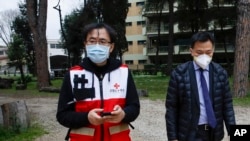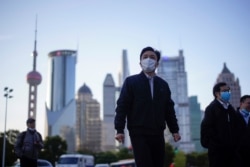In an effort to overcome its image as the home of two 21st-century pandemics, China has launched a humanitarian aid blitz by donating face masks, gloves and other medical supplies to countries hit hard by the coronavirus.
With the aid, China is looking to recast itself as “a responsible power,” according to experts, some of whom doubt Beijing’s so-called “mask diplomacy” will restore an image clouded by suspicions of a government cover-up. A British study suggested that if China had acted sooner, the number of coronavirus cases could have been reduced by 95% and its geographic spread limited.
But China, having slowed the internal spread of COVID-19 to a standstill by locking down cities and imposing other controls to limit movement and contact, is now moving swiftly beyond its borders just weeks after it was accepting donations of masks and other medical supplies from donors worldwide. From Asia to Europe, South America to Africa, China is providing or has pledged humanitarian assistance in the form of donations or medical expertise.
On Wednesday, the French foreign minister, Jean-Yves Le Drian, said China was sending 1 million surgical masks and gloves to help fight the coronavirus. The first shipment arrived Wednesday, the Reuters news agency reported, adding that France gave China 17 tons of equipment to combat the virus. Among other disruptions, the outbreak represents the biggest threat to France’s very visible and very profitable luxury goods sector since the 2008 recession.
On Tuesday, Chinese leader Xi Jinping pledged to the Spanish prime minister, Pedro Sanchez, that “China is willing to respond to the urgent needs of Spain and spare no effort to provide support and help, and share experience in prevention, control and treatment.” Begona Gomez, wife of the prime minister, has tested positive for the virus.
On March 11, Beijing sent a team of medical experts to help Italy battle one of the world’s most severe outbreaks of the coronavirus outside China. Italy on Thursday surpassed China in total coronavirus-related deaths, at 3,405. Last year, China signed a $2.8 billion deal with Italy, the first developed nation to participate in Beijing’s Belt and Road effort.
'Resolutely' committed
That China wants to burnish its image is clearly stated in an article published on March 19 in the official People’s Daily, "China's Battling of the Coronavirus Demonstrates China's Role as a Responsible Power.”
The article begins with Xi saying, “We resolutely safeguard the life, safety and physical health of the Chinese people. We also resolutely safeguard the life, safety and physical health of people in all countries in the world, and strive to contribute to global public health security.”
It continues, “In the face of the sudden outbreak of coronavirus, General Secretary Xi Jinping clearly requested from the beginning that the safety and health of the people be the first priority, and explicitly requested that international cooperation in epidemic prevention and control be expanded to reflect the responsibility of a responsible power.”
The People’s Daily report doesn't mention that the disease originated in China. It does, however, report, “At present, the epidemic is spreading globally and the situation is worrying.”
The article also doesn't mention that a suspected initial cover-up of the Chinese government delayed an effective global response by two months, as White House national security adviser Robert O'Brien suggested last week.
The People’s Daily article echoes another widely circulated article in Chinese media, “There Is a Warmth in the Global Pandemic Called 'China Aid.’ ”
Published a few days ago, it focuses on the humanitarian aid China is providing to Pakistan, South Korea, Japan, Iran and Italy. It emphasizes how quickly China mobilized the aid and how grateful the countries were.
“In the global epidemic, there is a kind of relief called ‘China Measures,’ a style called ‘China Responsibility,’ an attitude called ‘Chinese spirit’ and a kind of warmth called ‘Chinese aid,’ ” it read in part.
'Responsible power'
The article continues, “China's speed, Chinese power, Chinese spirit and Chinese aid, reflects the great superiority of the socialist system with Chinese characteristics, which highlights China's international responsibility as a responsible power. As an important force to dispel the haze [the coronavirus outbreak], China is continuing to make its own greater contribution to maintaining global public health security and people's health and well-being.”
Some scholars believe that mask diplomacy alone may not counter China’s image problem. As of Thursday evening, the virus had reached 166 countries, with nearly 208,000 confirmed cases and more than 8,600 deaths, according to the World Health Organization.
Stephen Roach, faculty member at Yale University and former chairman of Morgan Stanley Asia, told VOA Mandarin that “the mask issue is significant [on] one level, but not a decisive factor in rebuilding the perception globally about China’s role in maintaining the quality of public health.”
He said that if China really wanted to restore its international image, Beijing should start by reforming its public health regulations and policies. The COVID-19 outbreak is the second pandemic that originated in China over the past 17 years.
“The most important thing I think China can do is to announce major reforms in public health regulations and policies, rather than respond as a producer of masks and other medical equipment,” said Roach. COVID-19 issued “a wake-up call” to Chinese authorities not to let “this type of situation happen again,” he said.
In 2003, SARS (severe acute respiratory syndrome) spread to 26 countries and resulted in more than 8,000 cases and 800 deaths.
Like SARS, COVID-19 is believed to be a zoonotic disease, meaning it jumps from animals to humans. In both cases, human consumption of wildlife such as bats was the likely route of transmission.
Father Bernardo Cervellera is the editor of AsiaNews, an official press agency of the Roman Catholic Pontifical Institute for Foreign Missions (PIME). He wrote on March 12, two days after China pledged to send the masks and medical experts to Italy, that Beijing was trying to mask its role in what the WHO called a pandemic on March 11.
He wrote: “And this is not just regarding the sale of wild animals at the Wuhan market: We are talking about the silence of the authorities that lasted for over a month, before raising the alarm.”
What about free speech?
Cervellera continued, “I think that China's gifts to Italy would be even more welcome if Beijing and Xi Jinping gave his people and the press freedom of speech. He would do his people and the whole world a favor.”
Others believe that China will benefit geopolitically from its diplomatic offensive, especially since the U.S. closed its border with Canada on Wednesday, days after it began rolling out travel bans from Europe and other countries on March 11.
Douglas Paal, a special assistant to former U.S. President George W. Bush and senior director of Asian affairs at the National Security Council, told VOA Mandarin, "In many ways, I am concerned about the tragic and incompetent response of the Trump administration to this crisis. If China benefits from it, it is largely because we let it do it."
Li Ya contributed to this report.







